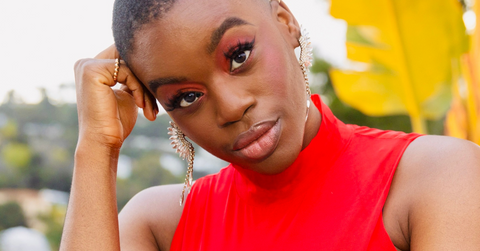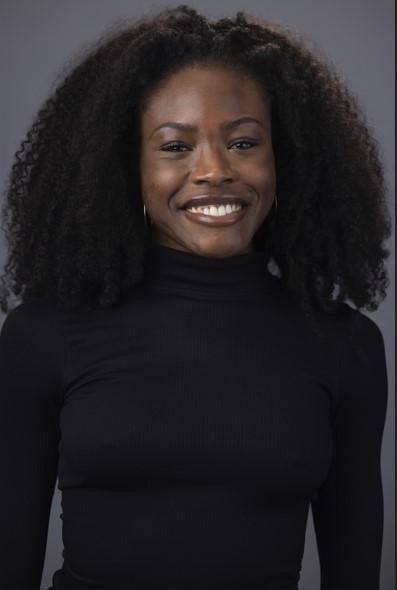Joy Ofodu is a professional voice actor, creator, and creative executive at Joy Ofodu LLC. Although she started off her professional career at Instagram as an Integrated Marketing Manager, Joy’s passion for performing was present from as young as three years old. Growing up in theater and taking other extracurriculars, like dance and acting classes, gave Joy the tools to self-produce her own media content that continues to go viral on social media. Through her self-titled media company, Joy has grown a community of 300,000 online daters and comedy lovers. She hosts her own podcast called Dating Unsettled, where she discusses her own life and gives advice to listeners to encourage them to challenge their preconceived beliefs about dating. She’s booked voiceover acting roles that range from meditation apps and monster voices and has had the opportunity to partner with trusted brands such as, Disney, The Daily Shine, and Dove.
Her Agenda spoke with Joy to discuss her growth as a creative since leaving corporate America. She talks about how her Nigerian heritage shows up in her comedy, creating a trusting community among other Nigerian creatives in the space, and why she thinks it’s important to stray from keeping our goals for love to ourselves and focus on being more outspoken when it comes to what we’re looking for in a partner.
Her Agenda: You recently received an Arts and Entertainment Award from The Creative Collective and Max. How does it feel to be part of this year’s 2024 Creative Class?
Joy Ofodu: It feels incredible and so right on time because I love the CultureCon organization and everything that Imani [Ellis] is doing. Not only that, but I’ve been feeling this rising star over my head for some time. To come to fruition as an entertainer and a creator and be recognized in a category among folks that I either like, know, love, [or] work with, it really just feels timely. I think a lot of recognitions can be nameless, faceless, [or] meaningless, but The Creative Class is the opposite of that. To be in one of the earlier classes and to have come to New York to accept the award was just perfect. It was timely.
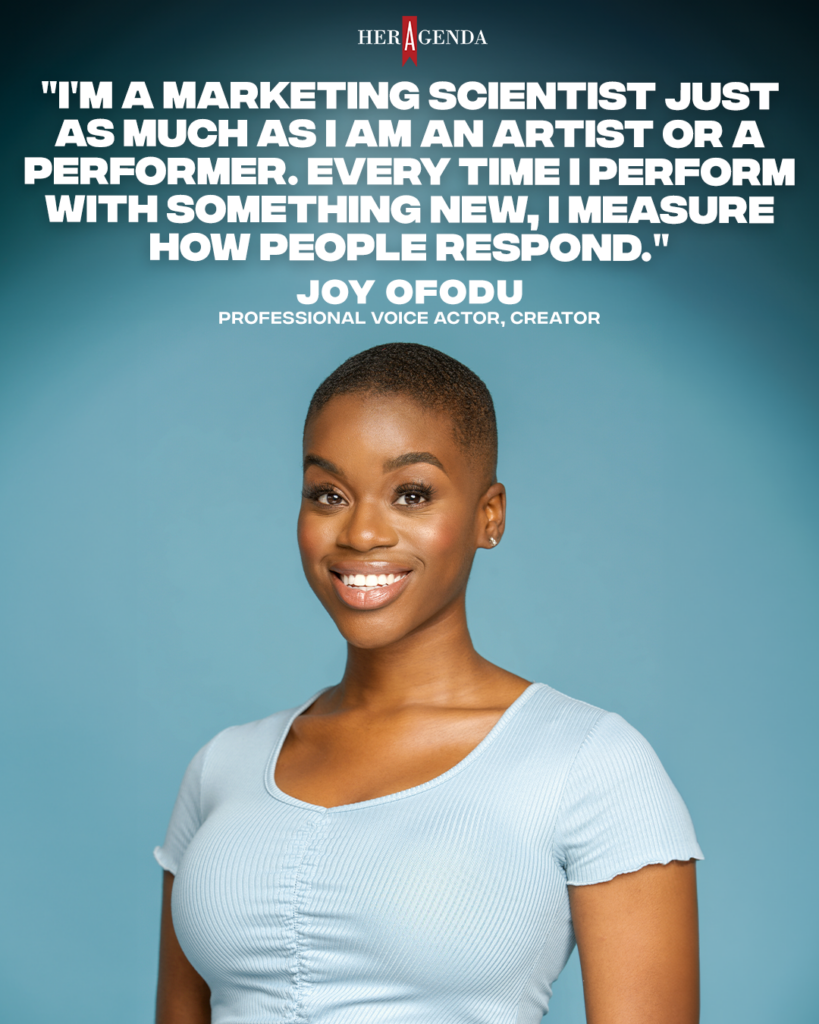
Her Agenda: How did it feel to be in a room full of other creators who took a chance on themselves in similar ways to you to get you to where you are currently?
Joy Ofodu: It just feels energizing. These days, especially post-pandemic, I’m looking for anything that can add energy to me as a creator and as an actor—anything that adds inspiration. [That] means [connecting with] Syreeta Singleton and Michael Oloyede [at the awards show]. [Michael and I are] in the same management company now. I was sitting with Dami [Kujembola] and Timi [Adeyeba] of Amplify Africa, and we partnered together in the same week that that was happening.
You just see all these beautiful, brilliant Black people hard at work, growing audiences, growing companies, and products. Things have never felt more possible or doable than when you’re at a dinner like that. There are things that have been sitting on my heart as a Black actress and as a voiceover actor, [and] to be able to be in a corner with Dominique Fishback and others is just like, yeah, this is a battery fill if that makes sense.
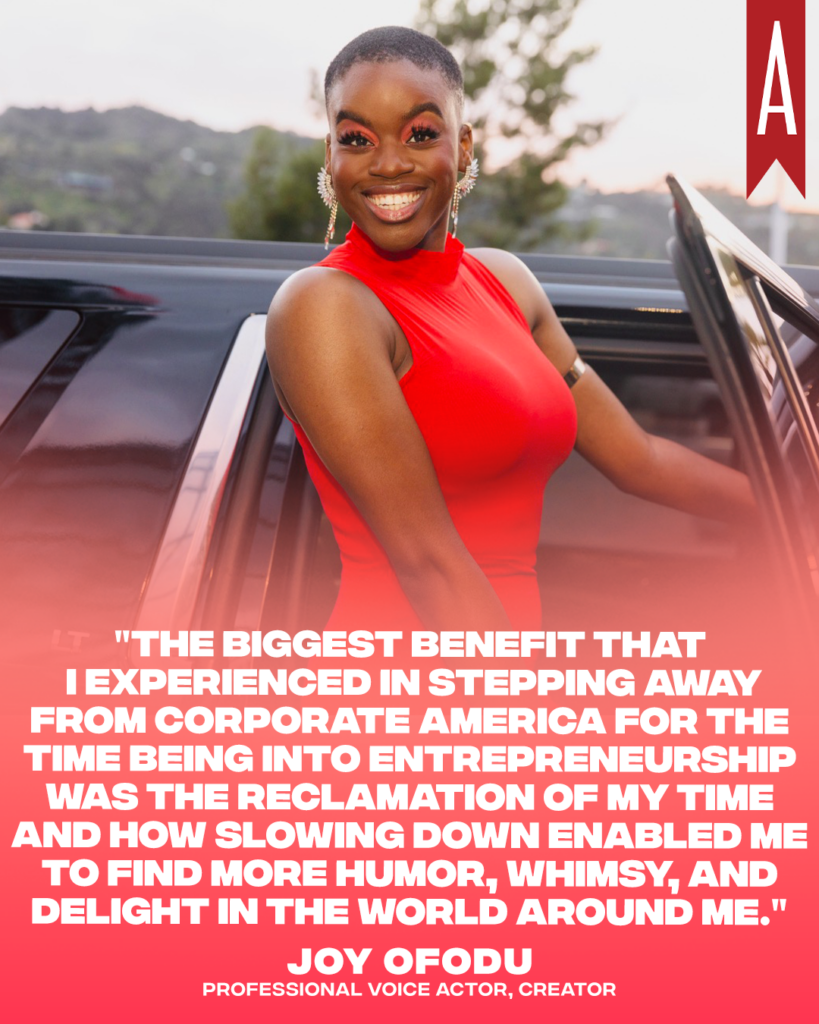
Her Agenda: When and how did you discover that you could tap into different voices and be able to do them as well as you do?
Joy Ofodu: Thank you. I’ve known about my range for some time, but the voice-matching/imitation skill is literally something I used to do when I was a kid. The formal or technical term is voice match. When I was young, I would listen to music [by] Avril Lavigne, Demi Lovato, [and] Shakira, and I would [ride] in the back of my parents’ car as we were on the way to different family functions, 30-45 minutes away. This would give me a lot of time to listen to my Limewire downloaded music and then quietly [sing] it and [see] how close I could get [to their voices]. It’s something that I’ve been doing to entertain my friends and family since I was very young. I love making people laugh.
If you check all my yearbooks, they would call me ‘the funny one’ and [write things to me like] ‘I love all the voices you can do,’ those types of comments came very early on. It wasn’t until 2020 [that] I started performing them online, in my original comedy, on Clubhouse, [and] in demos that I [produced], and then I immediately started getting booked because of that range. I have [a] kind of high educative, children’s narration voice then I also have a soothing meditation voice. From Little Monster Media to The Daily Shine where I was the leading voice of a meditation app in 189 countries. Towards the end of it, people, no matter where I was playing within my range, would recognize me and recognize my voice like, ‘Hey, is this you?’ Or people would send me stuff, ‘Is this you?’
Once I mastered that base of this is the meditative [tone] and then this is the energetic, lighter youthful tone, that’s when I started getting even more creative with my monsters, and goblins, and elves, and witches and started performing those on podcasts and animation. I love whenever I get the chance to voice something that people would not expect when they look at me, so I try my best to create media that remind people that I can do that. I recognize that it is a very unique talent [and] it’s been fun to take that all the way to Disney, for example, and start doing impressions of characters like WALL-E in front of WALL-E at the park. I think in the future, [my job] is going to look like [me] being hired to portray these characters now in [media in the animation guild union]. I’ve been cast in several animated feature films, as well as animated TV series, including a union animated TV series that I can’t wait to share hopefully very, very soon. Skybound Entertainment, [the company] that creates The Walking Dead and Invincible, I’m in a horror podcast, and you’re going to hear a very terrifying monster in English and in Spanish come out for me this Spring. That is my jam. I really like pushing my range. That’s something I’ve done [and] I could do since I was very little.
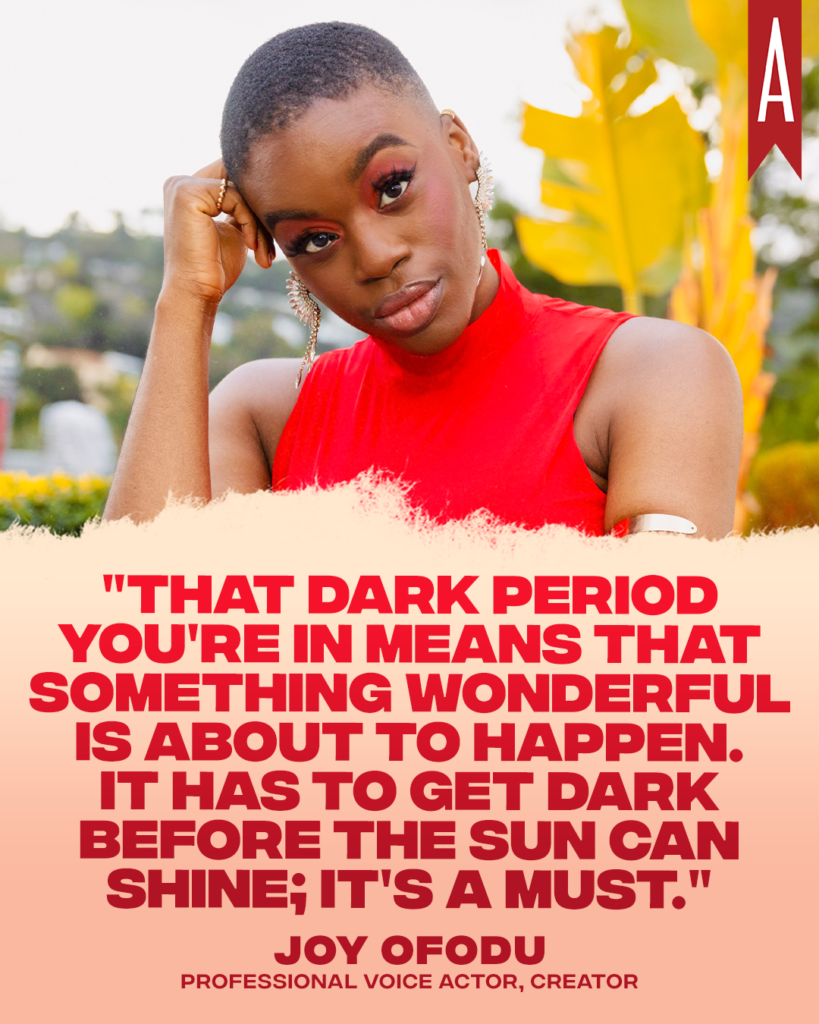
Her Agenda: Did you ever think that voice acting could get you as far as it has?
Joy Ofodu: I thought that on-camera acting would, so I was just a little bit off the mark. I had the, ‘wrong kind of acting,’ and now I do both, it’s funny. When I was younger, I begged my mom to sign me up for acting classes, and she did. I signed up for acting, modeling, on-camera, [and] runway [classes]. [I] started auditioning, I had two agents, and I booked a pilot. It was called Hey, You Up There [and] I was on camera interviewing different athletes like Jackie Joyner-Kersee in San Francisco. That was my first on-camera acting job. It’s just so funny because I was banking on on-camera being the thing, and that’s what led me to being on stage, but I missed out on this voice-acting specific focus. It is kind of wild to think about what my career would look like, [at] this moment, if I’d been voice acting since a child.
I’m grateful that I’ve fallen into it. I think once I began to record my voices, and publish the demo, and I saw the reaction to that demo, I knew that voice acting would take me this far. I have a very fundamental belief in myself and in my talent that is informed by the responses that I’ve been getting. I’m fortunate that I’ve been able to play with my voices and vocal performances throughout my comedy and these videos, many of which have gone viral to where I got [thousands] of points of feedback. All of that informs my work. I’m a marketing scientist just as much as I am an artist or a performer. Every time I perform with something new, I measure how people respond. It’s been delightful for me to see that belief that I have in myself and in my own talent validated through the casting, validated through the invites, the heightened level of opportunity, and even people’s genuine responses.
Her Agenda: Nigerian parents tend to see their children in only certain types of careers, whether it’s the medical field, being a lawyer, engineer, or somewhere in the sciences. How did your parents respond to your creative endeavors growing up? You mentioned your mom signed you up for acting classes, but were they accepting of it? Were they resistant [to] it? What were their impressions of what they saw in you creatively?
Joy Ofodu: When I was three, they signed me up for dance so there was a very early signal for them coming from me. I would love to be dressed up, and I would love to be on stage. I did that from three to six [years old] before I started getting into sports. I’m very grateful that they eagerly and enthusiastically signed me up for different activities so that I could test my talents and my curiosities.
We had those early acting experiences, and I think the biggest way that my culture showed up is that to be a Nigerian immigrant in America already requires [dealing with Americans testing] your trust. [My parents] came here, and within years, they were masters educated. They were not born yesterday, but due to bias and discrimination [in this country], [they] would sometimes get treated like it. Now, you have this precious thing of a child; you’ve got people selling your child dreams in this foreign land and in this uncertain economy. I grew up at that point of the 2007/2008 economic crisis when I was coming through elementary school. So, you’re going through tough times [and] you have this child that you have to protect that these American people are telling you, oh, this is the American dream, and this is what’s gonna get your kid to be successful here in this country. It’s rough. So, I give my parents credit. They navigated with heavy skepticism but as much support as they could give with the tools that they had. I think their skepticism about the entertainment industry and the dangers of it, are part of what drove me more so towards community theater, as opposed to continuing to do national auditions and continuing with my national representation. [My parents] were like enough of this agent stuff, commercial stuff, TV [and] film; it just felt too far away and too foreign. Let’s pull you into how we can continue to support this habit with you not being too far from home.
We did struggle a little bit because while I was exceeding academically, there were a lot of hours required to be a good young artist [and] a good theater performer. I had to continue to prove that this is how I’m going to get into a good college. All my investments led me to receive a full tuition merit scholarship to USC. If I hadn’t been as involved [and] advocated for my own position in the arts to my parents, it may not have led to the opportunities I had at USC to study a little bit of business eventually. Here’s where, again, my parents were right. They were like, [I’m] made for tech. They kind of saw art as a hobby and not a career, but business and stem as a career. They were like, ‘You’re made for more; your brain is capable of more.’ Oh, how they push you. They pushed hard, but it was worth it. I did end up working at Instagram for multiple years, excelling in Silicon Valley, and [was] named a leader in certain publications as I was moving through tech. [This] gave me a great foundation to launch my own business and make myself the lead talent in the commercials and original productions that I put on. I’m not just coming at it anymore from an artist’s perspective, but from that business perspective, because of [my parents’] very Nigerian advocacy.
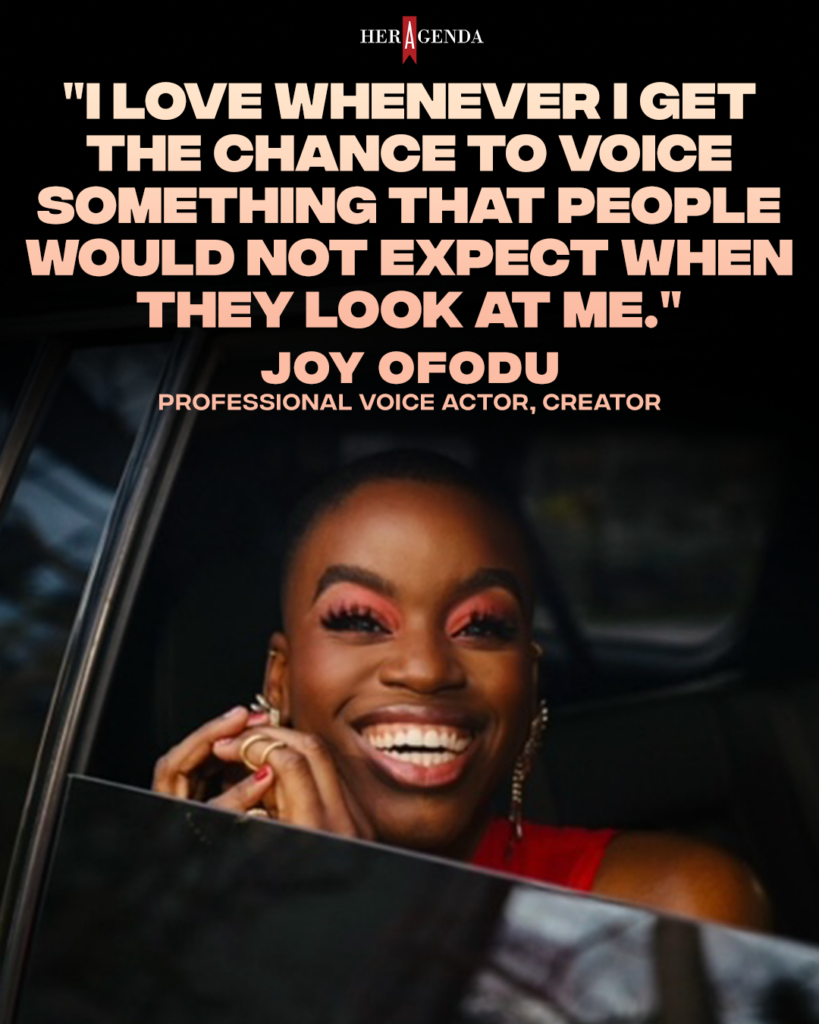
Her Agenda: And, out of curiosity, how does [it] feel like coming into this creative space, and [seeing] more Nigerians in the space with you and seeing that other people like you, ethnically, have made it possible to succeed in a space that was once considered so foreign, or more of a hobby to most Nigerians?
Joy Ofodu: It’s vital. We are all bringing each other up [and] we’re learning from each other as we go. I was sitting around their table [with friends and fellow actors] as we were celebrating the release of Iwájú with Disney[+]. As we’re sitting at the table, I was looking around at everyone [and] I was so filled, and so impressed. Like, there was just a golden glow about us being able to be our artistic selves, and not be limited by parental pressure or economic predictions. Just sit and be artsy and be creative and have that not be powered by the African-ness but also produce something African. [To also] produce African media, to review a Nigerian meal, to listen and dance [to] our music. How many Nigerian Summers have we had of music? Of Davido? Of Burna [Boy]? Of Tems? I’ll be telling my children about the time when it was shocking to hear Davido come out of a Starbucks. It’s golden. It’s yummy. It’s delicious. It’s something that I think I’ll always remember this time.
We’re setting new precedents and there’s a trust that occurs within our Igbo community [and] within our Nigerian and African community. It’s nice not to have to worry as deeply if someone has taken advantage of you [or] is jealous of you. We’re just in this space where we’re so strong. I think of the story about Giannis Antetokounmpo, who just recently demanded that Nike pull his brother in for a deal as well. I was so pumped up by that. Like, yeah, bring your brother along and make it mandatory. There are ways that I’ve shown up to events and added my sister [,Sofi]. Sofi (@the_odditty) and I were both recently at the Dove event. It was my first national commercial, and she was there in attendance. They pulled her aside for an interview, and she spent 80% of her interview just celebrating me and talking about how excited she was for me as her sister. These are moments that I treasure, and I go up so hard for my sister, Joy Sunday, who’s the newest global face of Lancome [and] who’s on Netflix’s Wednesday. She’s kind of showing me what’s possible with on-camera. All of it makes me quite emotional and energized.
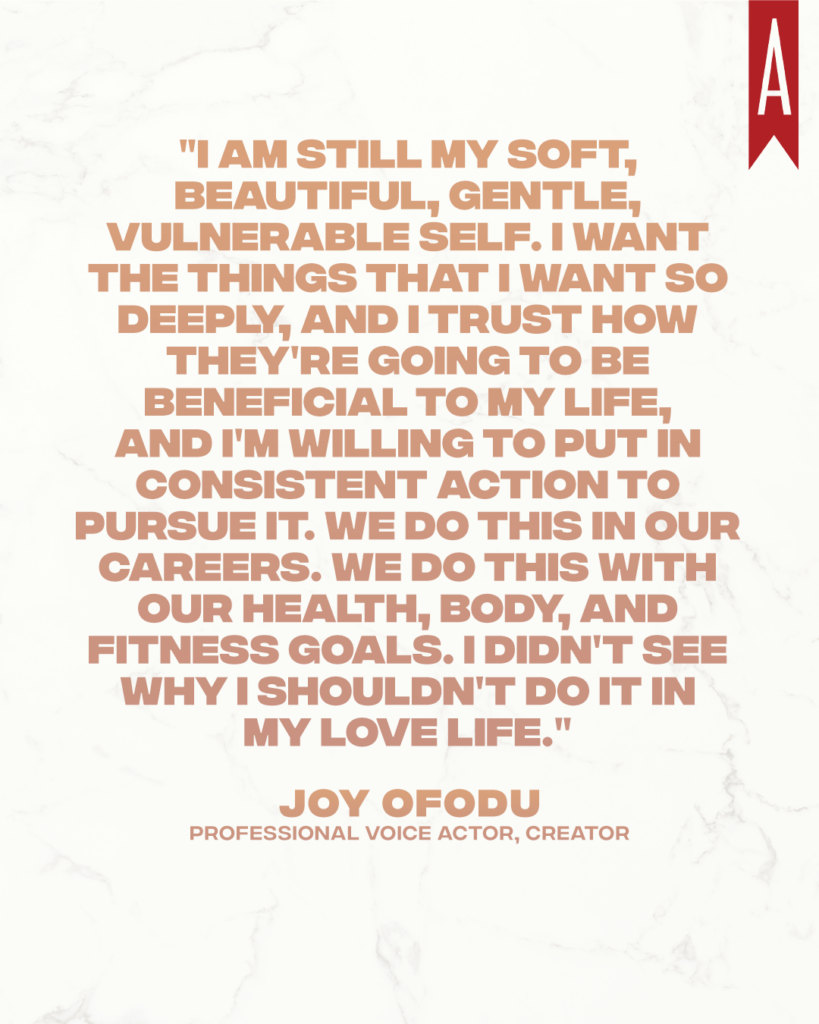
Her Agenda: [Let’s] shift gears a bit to talk about your podcast, Dating Unsettled. You talked about how when you take on a new business endeavor, you share [it] with whoever you can, and then back when you were single and getting back into dating, you were open about your journey of getting back out there. How do you think we limit ourselves when we try to keep new adventures in our dating or career lives close to our chests?
Joy Ofodu: It’s not that it’s wrong or incorrect, but it’s limiting. People usually come at that from a place of fear—if I let people know I’m looking for love, they may make fun of me. If I let people know I’m looking for love, they may take advantage of me. They may be gossiping about me. We go straight to negative. I was single during the pandemic, in a time where if you literally didn’t cry and speak it out, you were not going to be heard. D-Nice had to get on Instagram Live every single week to share the music that he loved to further his legacy as a DJ. You have to just keep getting out there. For me with dating [and] love, I [was] looking to meet an educated fine Black man who’s funny, considerate, healthy, [and] shares my religion. I [was] looking for so [many] specifics that I knew I couldn’t really do it alone. I needed the help of everybody who loves me, cares about me, [and] is entertained by me to call in this goodness with me. When you open yourself up and you say, ‘Hey everyone, I’m looking for love,’ you get free cheerleaders. You get a free cheering squad, you get advocates, you get 1000s of people who are just supporting you and commenting, ‘I hope you find it,’ ‘update us, keep us posted,’ [and] ‘Marry him sis.’ Whatever the encouragement, misguided or not, it was beautiful.
With Dating Unsettled, long before I launched the podcast, I was already doing what I do with Unsettled, which is, being a Black woman who’s talking about looking for love in an era where young Black women are being abused, mistreated, disregarded, [and] passed over. Statistically, we know that finding love on dating apps is tougher for us, but not impossible. That’s where I get energized. I told you, I’m a scientist. I’m looking at these stats talking about how many Black women find love or what percent of marriages end in divorce, and I’m here sitting with my long held, Disney princess-inspired love story dream of what I want for a relationship. I look at those statistics, and I say that even if we are the least selected or swiped on we’re still getting chosen, we are still choosing. It’s not about sitting in your room and being alone and crossing your legs and doing everything that we’ve been told to do by society or the ways we’ve been conditioned to be silent and approachable and not the one approaching. I just knew that that wasn’t going to yield me the results I was looking for. I am still my soft, beautiful, gentle, vulnerable self. I want the things that I want so deeply, and I trust how they’re going to be beneficial to my life, [and] I’m willing to put in consistent action to pursue it. We do this in our careers. We do this with our health, body, and fitness goals. I didn’t see why I shouldn’t do it in my love life.
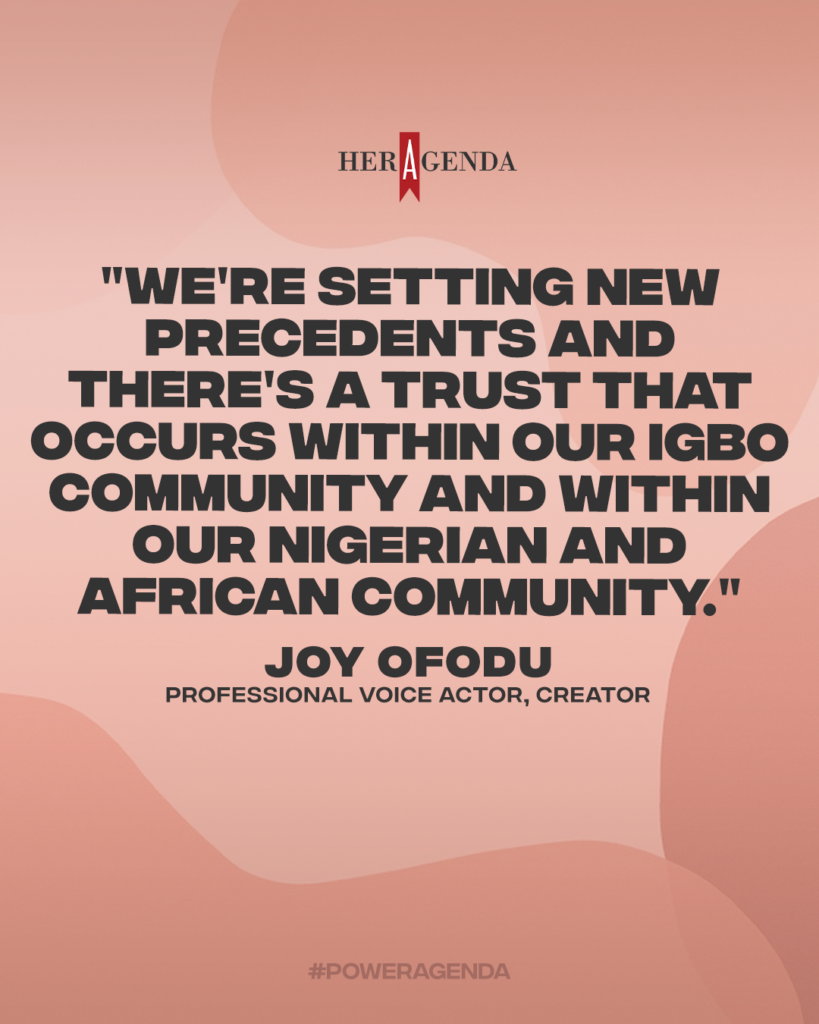
Her Agenda: You’ve taken on the role of dating expert with your work, and you’ve been featured on GMA giving tips on how to refresh your dating life. You’ve spoken to numerous publications on dating topics, and then you also have like the ‘Unsettler Requests,’ [where] you respond to advice requests from your listeners. What tidbits have you learned in your dating journey that you find yourself sharing most often with folks who are looking for that look to you for advice?
Joy Ofodu: I think the first is having an app strategy, and I did touch on this with GMA. Dating apps are daunting for a lot of people. When they hear that I have combed through 3000 profiles, had over 160 conversations, and over 21 dates to land on my now boyfriend of over two years, they’re like, how the heck did you get through it? How did you comb through all that?
So the first recommendation or piece of strategy that I find myself sharing a lot is to approach the apps with a strategy and with intention. Just swiping is not going to do it. Not paying is not going to do it over time. The more time you put into dating apps, the more effort and bravery that you put into these conversations, vulnerability, and sharing yourself, the more likely you are to yield the results that you want. This doesn’t mean that if you spend $200 on a dating app today, your boyfriend will arrive next week. What it means is that you are quicker to discern whether or not the person in front of you is someone that you want to proceed with or move on from. I think that a lot of people get stuck, especially women, because of the ways that we’ve been conditioned to see things out and not lead, frankly.
For the traditional girls who read Her Agenda, there are ways that you can let a man lead and still be your own decider of whether or not you want to be present. What happened to your own autonomy? So, having a strategy that says, I’m going to log on at these times and these times. I’m going to swipe this frequently, and I’m going to exit when it doesn’t feel good or pause subscriptions. I’m going to make an effort to financially invest in these apps where I feel like I’m having the best kind of interactions. I’m going to make a genuine effort to either meet the person that I’m speaking to or disengage. That honestly is the biggest thing with dating apps. Don’t let things live online. Now that the world is open and we can just meet each other, let’s do so. Let’s not let things live in ‘pen pals’ [situations]. ‘Pen pals’ is a situation that you are accepting. You can try to get it to an in-person interaction. If you don’t want to ask somebody on a date, suggest that you would love to be taken one. For all the girls that are like, ‘But, I don’t want to lead,’ suggest that you are available, and then let them make the ask.
The final thing would be don’t argue with people who you are not attracted to, or do not seem to be in community with [you]. Do not spend that time trying to convince anybody of your worth or your value. If you find yourself pitching yourself to somebody, auditioning for somebody, and he’s not a paying client, then it’s time to get out.
Her Agenda: When you left [Instagram] and took on content creation full-time, what strength came from taking control of your career in this way?
Joy Ofodu: The biggest benefit that I experienced in stepping away from corporate America for the time being into entrepreneurship was the reclamation of my time and how slowing down enabled me to find more humor, whimsy, and delight in the world around me. When you are putting everything that you have into managing another brand, the way that I was managing and stewarding the Instagram brand, you sometimes neglect the opportunity to do so for yourself. If you ask a lot of social media managers, senior marketing managers, or brand marketers if they are applying the same best practices that they’re sharing with others to their own profiles, [around] six out of 10 of them are going to tell you no. That was the case for me.
When I slowed down, I started looking at the world around me as an entrepreneur, [and] as somebody who was only accountable to [myself]. The only person who is going to make sure I show up to work today is me. I have more time to chat with people, to notice things, to be reflective, and to reminisce on things that I’ve been thinking about before. It sounds so simple, but I genuinely encourage anyone who can do so. If you’re in corporate America, it’s not that you can fully step away. But, if you can even get a one-month break, that’s all it took for me was a one month break while I was still working to be inspired enough to make my exit plan. I started requesting creative pitch meetings, learning about producing graphic novels and TV series, and just consuming more as well as producing more. I think that when you are working full time, unfortunately, you can just get stuck in this wheel of production for work consumption for yourself as a fan, and then you miss the production for yourself as a brand. The biggest gift was time and seeing the world around me.
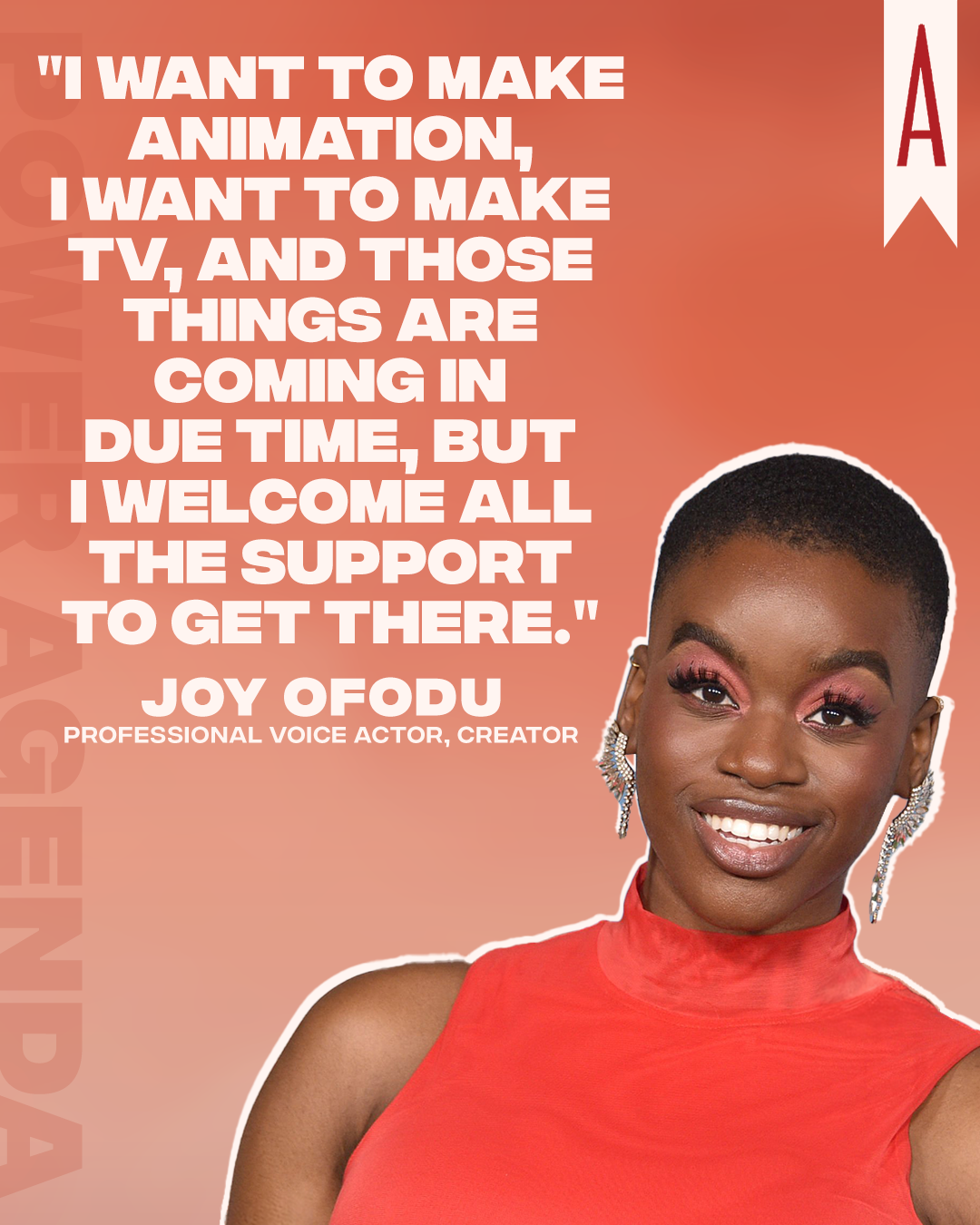
Her Agenda: What is your motto?
Joy Ofodu: No weapon formed against me shall prosper. Also, this is a good one to take from Florence Welch, ‘It’s always darkest before the dawn.’ So, in those moments where I find that I’m getting a lot of rejection, or it’s very grim or not as resourced as I want to be, or I’m being passed over for opportunity, whatever it is, telling myself that it’s always darkest before the dawn, that dark period you’re in means that something wonderful is about to happen. It has to get dark before the sun can shine; it’s a must. It’s like [when] people say flowers can bloom all year. It’s so cool to know that it’s a signal that if I’m having an incredibly difficult time, seeing that not as a setback, but as a necessity. It is a necessity for you to struggle. It is a necessity for you to be rejected. It’s a necessity for you to not have the information that you need, to not have the money that you need. This is needed in order for you to advance to the next step, which can only be up from here.
Her Agenda: Is there anything else you want to add that we didn’t touch on? Joy Ofodu: I think for me, just knowing that what’s next for me as an entrepreneur is growing the original offerings from my media company. While I do have incredible agents who are looking out for me as a talent, I’m open to and looking for mentorship from other senior professionals who know what it’s like to produce original content. I want to make animation, I want to make TV, and those things are coming in due time, but I welcome all the support to get there.
[Editor’s note: This interview has been edited for length and clarity.]

